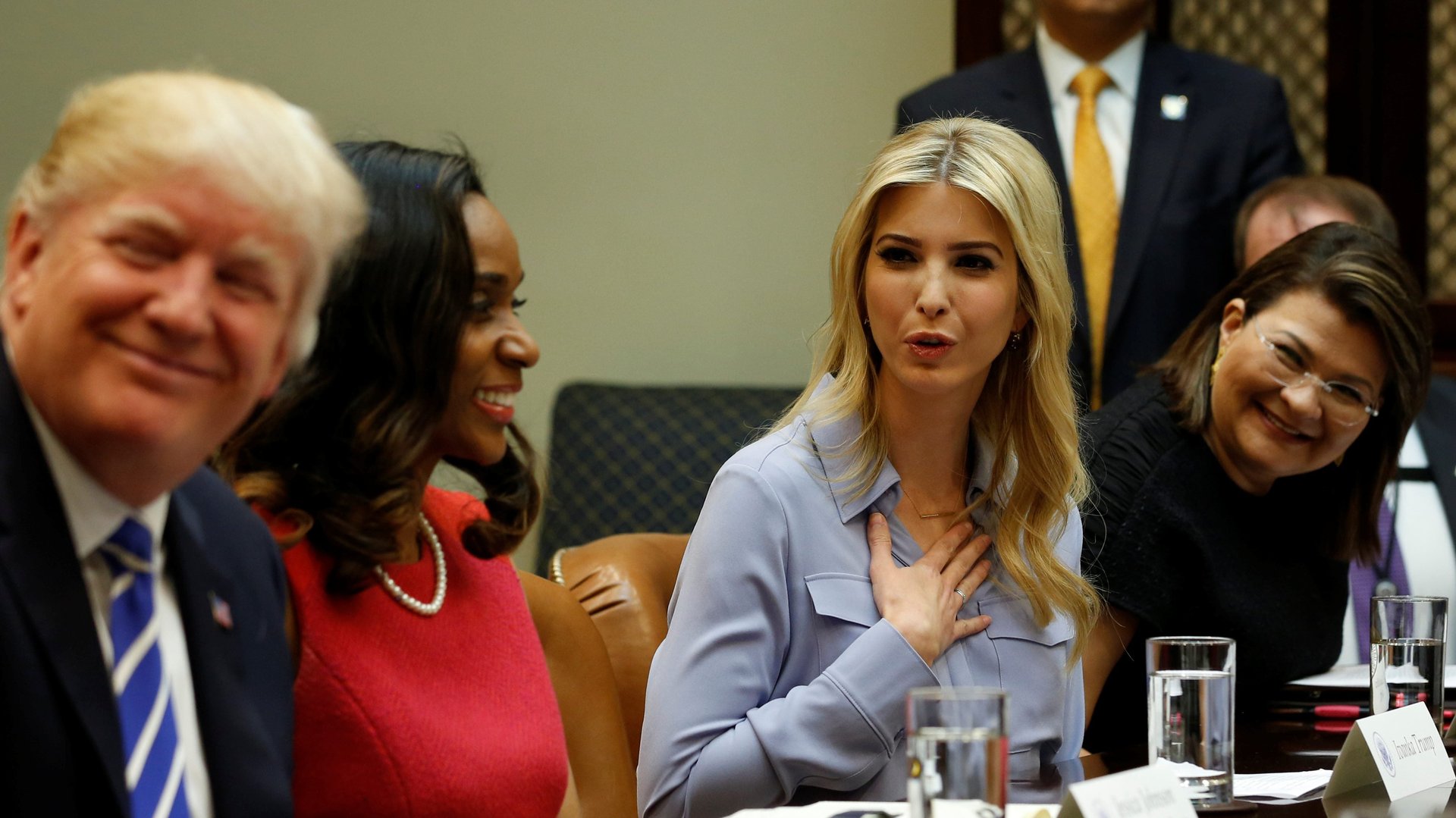Ivanka Trump’s new job shows she is no role model for working women
After serving as an informal advisor to her father, US president Donald Trump, Ivanka Trump will assume an official role at the White House as “assistant to the president.”


After serving as an informal advisor to her father, US president Donald Trump, Ivanka Trump will assume an official role at the White House as “assistant to the president.”
The title, despite its secretary-ish connotations, is a prestigious one by US government standards—everyone from chief of staff Lewis Libby to presidential speechwriter Michael Gerson was an “assistant” to the president in the George W. Bush White House, for example, although often there is an additional title that comes after it (eg “and deputy national security advisor”).
But the appointment is a jarring example of the contrast between the aims of Ivanka Trump’s life and her #WomenWhoWork initiative and book of the same name, which purportedly celebrates the “modern working woman” and hopes to help “change the system to make it better for women.”
Nepotism, not feminism
Ethics lawyers, first of all, say Trump’s new job violates the anti-nepotism law passed in 1967 that forbids federal employees from hiring relatives. The White House argues that isn’t true because she will not draw a salary—an argument it also applied to her husband, Jared Kushner, who is a senior adviser in the White House. (Legal scholars are divided on whether the law is being broken.)
Trying to position herself as voice for working American women while taking a job only available because her father is the president has earned the senior Trump daughter a rising number of detractors. As Amanda Carpenter, a former communications director for former Republican candidate Ted Cruz, wrote recently in Cosmopolitan:
Just remember she’s only sitting in that seat because her daddy let her. That’s not the case for the overwhelming majority of working women in America and we shouldn’t celebrate anyone for whom that is.
Women make up just 27% of the people hired in the Trump administration so far, ProPublica found. But by taking the seat, his daughter is potentially depriving a woman with experience in government of it.
No one knows what her responsibilities are
The nepotism issue aside, Ivanka Trump appears to have hit some of the classic pitfalls that hold working women back.
What will she do at the White House, exactly? It is unclear, and the new, unspecified title of “assistant to the president” doesn’t help. She’s already been held up as “the real first lady” and the one person who can best calm down the president, so expectations are high.
A White House statement said she would “lead initiatives driving real policy benefits for the American public,” without being more specific. Her own statement said she will “serve as an unpaid employee in the White House Office.” Not setting clear goals is one reason that women fail to excel at their careers and be promoted.
More qualified than her husband, lower title
There are few people with more experience assisting and advising Donald Trump than his eldest daughter. And, through her work with the family business and her own fashion label, she’s traveled far afield to negotiate with foreign officials and businessman.
She went to Baku, Azerbaijan, for example, as the Trump Organization worked on a controversial luxury property deal with family of the Minister of Transportation, and negotiated a licensing deal with a Japanese state-backed company.
Her husband, Kushner, on the other hand, spent the bulk of his working life in the New York City area, where most of the properties owned by his family’s real-estate company are located. Yet Kushner is a “senior advisor,” a title given to high-ranking assistants to the president, and has been handed a menu of responsibilities that include international diplomacy from China to Israel to Mexico.
Of course, Ivanka Trump has only just been appointed, and her role may, like her husband’s, grow in importance over time. For now, though, her situation seems to illustrate a common problem facing working women: men get more of the plum assignments (paywall) that lead to advancement.
This article originally said, incorrectly, that the Trump Organization worked with the Minister of Transportation on a deal in Azerbaijan, rather than his family.